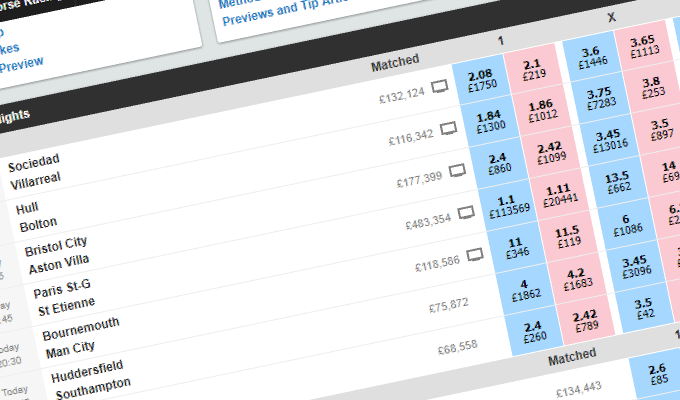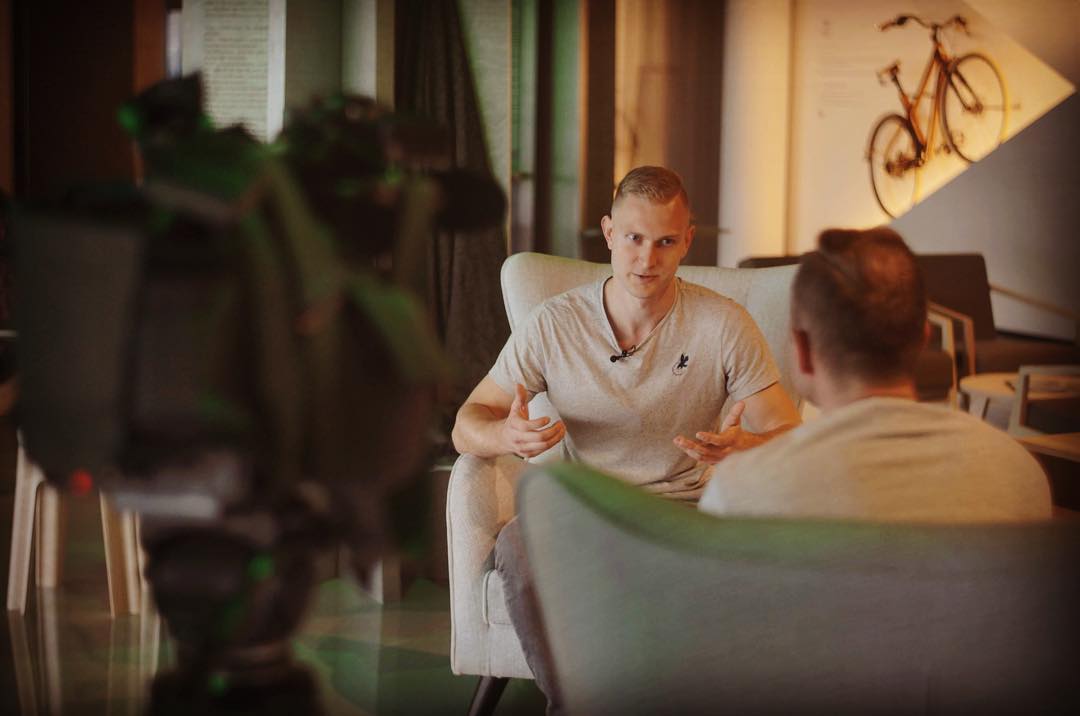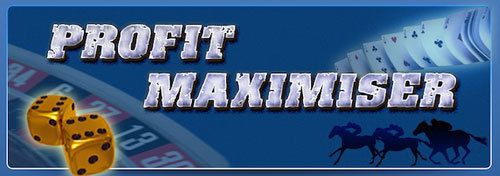This article will give you a general guide for making money on Betfair, after reading this you will understand better the qualities needed to become a successful sports trader.
The Betfair Exchange is a peer to peer betting exchange, this means that you can trade bets with other users on the site, making it the first and definitely the largest peer to peer betting platform in the world. On Betdaq you can do all you can do on Betfair and sometimes more and is catching up to Betfair in user numbers.
What does this actually mean?
It means that unlike betting with a conventional bookmaker you can back against or ‘lay’ an outcome, in essence you can become a bookmaker.
Yes but what does that mean and how does it help me?
It means that for every action on Betfair there is a reaction, every time you back something to happen there is somebody somewhere laying it not to happen happen.
So how can I take advantage of this method of trading on Betfair and make money?
Coming to Betfair Trading Tips was a good start! OK now I’m going to break it down for you in three easy steps.
Mental Attitude
Having the right mental attitude when trading on Betfair is key to success and not just when trading, but in life in general if you start something with the wrong mental attitude, you’re going to fail, simple as.
Let me give you an example of the power of the correct mental attitude, I am a keen amateur golfer, I have been playing the game for around twelve years now and for most of that twelve years I’ve sucked at it, I mean really sucked.
The amount of times I’ve given up the game, usually after a terrible round of not being able to make the ball get off the ground, let alone hit it in a straight line. Before declaring myself out of the game for good, I’d usually have a shout and a moan, saying things like ‘What’s wrong with me?’ and ‘I’m so crap at this game!’ and so on and so on.
Hey guess what? I was right, there was something wrong with me and I was crap at the game, I used to hit one good shot in about thirty or forty shots, I would hit one great one every hundred to a hundred and fifty shots.
Last month I broke my personal best for nine holes and smashed my old pitch and putt record; I now regularly hit the ball high and straight. I hardly ever hit little dribblers from a nice lie and have cut down bad shots from the rough by about 80%.
So what happened? Did I get a new flash set of Ping clubs? Did I get down to my local driving range and book a thousand pounds worth of lessons? Did I watch endless YouTube videos on how to drive/putt/chip/pitch and get better?
Nope I did none of those things, instead I read a book and in that book, even though that book was about golf, there wasn’t one single golf tip in it. Not one, nothing, no tips on how to hold the club, or how to stand, or shaft angle or anything like that, the book was in fact all about the mental approach to the game.
The book by the way is called Zen Golf: Mastering The Mental Game, I highly recommend it if you’re a golfer, it will change your life and that’s no understatement, click on the link above, it’ll open in a new tab, go to it after you’ve finished this article. I’ve also got his putting book; Zen Putting – Mastering The Mental Game On The Greens on my shelf ready to read and if it’s as good as Zen Golf I’ll be a pro in no time!
Right back to trading; so if I can dramatically improve my golf game and subsequently my scores in just about one of; if not, the most technical sports that us human beings have ever invented, by simply adjusting my mental approach, then doing so with something infinitely simpler than golf should be a doddle.
Every successful trader on Betfair has the right mental attitude; but what do I mean by that? And how can you adjust your mental attitude to that of a successful trader?
Let’s take a look at some of the qualities it takes to be a successful, money making, trader on Betfair.
- Consistency
- Concentration
- Determination
- Calculating
- Decisive
- Knowledge
- Luck
- Integrity
- Money
- Intelligence
Above are a bunch of words that are often associated with traders and the act of trading, I’ve put all the important ones together, which group do you think that is, the left or the right?
Hopefully you’ve realised that the characteristics on the left are far more important than those on the right.
First of all, luck has nothing to do with it, there is no such thing as luck, there are just random chaotic events which sometimes fall into a pattern of eventuality which we call luck but is more accurately referred to as probability.
Not convinced? Well you need to be, because believing in good or bad luck will ultimately hinder you when it comes to you making like a bandit on Betfair, believing in luck will have you avoiding certain ‘unlucky’ trades or putting far too much into other ‘lucky’ trades.
If a piano falls on Simon’s head at the precise moment he walks past a window we call it bad luck, but if we delve into the facts we see that Simon walked past that window every day on his way to and from work, his lunch route also passes the window.
Simon has worked at his job for five years, meaning that Simon has walked past that window approximately 2300 times. The window belongs to a Piano shop whose doors on the fifth floor are too small to fit a grand piano through, so every Thursday when they take delivery of a grand piano they hoike it up the side of the building with ropes.
Simon has walked under that window while they’re doing this approximately 240 times since he started work there, meaning every day Simon had a 1 in 9.58 chance of that piano falling on him.
When you look at it like that 1 in 9 and a half doesn’t seem so unlucky, and the lady who said; “Poor bloke, must have been a million to one chance of that happening” was very wrong..
There is no luck, just probability.
As for the other words in the right hand list, integrity, money, knowledge and intelligence, whilst these may help you in your quest to become the ultimate Betfair trader, you don’t need them. Obviously you need some money to start, but you don’t need a large bankroll and you need some intelligence but I can guarantee that there are people out there with lower IQs than you making money on Betfair.
OK, got that, but how do I obtain the perfect mental attitude?
Keep Calm, Don’t Panic!
This seems like obvious advice and it is obvious, it’s obvious when you’re sitting there just reading this and trading is just an abstract concept seated somewhere between your conscious and subconscious mind.
However in the heat of battle when you’re right in the middle of a trade it’s not so obvious and you need to verbally remind yourself of that fact, that’s right just as you’re thinking of opting out of your position before you’ve hit your target or even worse before your stop loss point, say out loud to yourself;
“Keep calm, don’t panic”.
The reason you’re doing this is because the human brain did not evolve to specifically handle the intricacies of trading, rather we have adapted to trading using specific traits that match up fairly well to it, but not exactly.
We evolved as hunter-gatherers, that is to say our daily routines consisted of looking for food either by gathering nuts, fruits, berries and so on, or hunting other mammals, birds or fish.
As we went about our daily lives we would have come across various scenarios, a small mammal running away from us would have triggered biochemical responses in our brains and bodies that said; hunt!
However a large predator stalking us on the horizon would have triggered different biochemical responses that said; run!
This is more commonly known as the fight or flight response, because the fight or flight response is triggered autonomously in this biochemical fashion it is open to abuse.
For instance if you have just come off the back of a little losing streak which has seen you lose £75 and you’re in the middle of a trade that’s going well whereby you’ve set a stop loss of £10 and a green point of £40 then the closer you get to your green target the faster your heart will beat, which in turn will encourage the production of cortisol and adrenaline, two hormones linked with stress and immediate action.
In this situation you will start looking for reasons to take flight, run away and keep the money you’ve got instead of risking it turn the other way, putting you in a losing situation.
You need to take control by saying out loud; “It’s going well, keep calm, don’t panic.”
Not doing this could result in you not realising your maximum profits on a trade that’s going your way, making any losses even worse because you haven’t maximised profits.
So remember trading can be stressful, but you’re not going to get eaten by a sabre toothed tiger, the worst thing that can happen is you’re going to lose a bit of money, so repeat after me; “Keep calm, don’t panic!”.
Concentration and Focus
Concentration and focus are essentially the same thing, to stay focussed on something is to concentrate on that thing, but I’ve said it twice because it’s even more important than keeping calm and not panicking.
If you don’t keep calm and you do panic, then as I’ve said, you’re likely to cut and run from a winning trade, but you’ll still win.
If you don’t focus and concentrate you could end up losing a lot of money, so as John Fashanu used to say; “Focus, focus, focus!”
You should concentrate as you are picking your trade; this is helped again by vocalising what you think about the trade. As you are talking out loud about the trade, talk about the stop loss you’re going to set for yourself and the green point as well.
Talk out loud about how you expect the market to evolve, discuss with yourself what you think will happen at the various landmark points in the event.
Talk about how the trade could possibly go wrong and what you’ll do if that situation arises, talk about as many aspects of the game as you can, but you must and I can’t stress this enough, you must say this all OUT LOUD.
Don’t think that it’s enough to do what I’ve explained above in your head, it isn’t, speaking out loud like this focuses the mind by making things real and solid and seat’s any thoughts you have firmly in your conscious mind.
If you don’t believe that, think about the last time you or someone you know repeated a silly little factoid from childhood without thinking about it; like ice doesn’t catch germs or when the ice cream van play’s music it mean’s he’s run out of ice cream or any of the other things you’re told as a child, forget and then don’t repeat until adulthood.
The reason you repeat something that is so obviously not true is that it’s been sitting in your subconscious as an unvocalised thought, but the second you vocalise it you give it strength and substance and only then can it be properly examined.
So speaking out loud about your trading strategy will help you spot any flaws in your plan that you might not have spotted had you kept it all internal.
When it comes to the time of the event you can reiterate what you’ve told yourself earlier, then, when the actual event starts you can keep your focus by commentating on what’s happening.
For instance, you’ve backed under 2.5 and the game starts frantically; at this point you say to yourself, “This is what I said would happen earlier, a frantic start, but ultimately with no goals.”
Or; “I said I’d cash out if there was a goal before 10 minutes, so time to cut and run”
It’s getting to half time and the favourites hit the post and have a flurry of corners and free kicks in dangerous areas, at this point you say to yourself,
“Keep calm, don’t panic; they are pushing for a goal before half time, but nothing has changed, their main striker is still injured and the guys on the pitch don’t look like they’re capable of scoring.”
Equally if it’s not going well or not going as well as you’ve anticipated then you can question yourself about whether you need to amend your strategy, you’ll find that you’re giving yourself concise logical answers and you’ll feel much more settled in whatever course of action you decide to take.
Using constant verbal reminders focuses your mind and keeps you from making rash decisions and it reaffirms in the conscious mind that you are determined and decisive; two traits that will help you go a long way on Betfair.
An example I can give is; the other day I was trading the under 2.5 goals market in a Europa League match, I went to cash out at 68 minutes because I feared a goal at around the 72-80 minute mark.
A combination of Betfair delay and my own computer choosing that moment to go slow on me, meant that a second goal was scored on 70 minutes and I was left looking at a book that had been green and full of profit to one that was still green but the profit was now measured in pennies.
I was so angry that I was going to just leave the trade to the end, so that I could get back to where I’d been, but then I calmed down and said out loud;
“I’m now in an unacceptable risk scenario whereby one goal kill’s me and I lose everything, I said that I would avoid unacceptable risk scenarios and the game does look much livelier after that 2nd goal.”
That was it for me, saying the words out loud like that put it into stark perspective what was going on, so I cashed out for a 50p profit and eight or so minutes later on the 80th minute, a third goal was scored and I thought of how annoyed I would have been had I let my anger get the better of me.
To train the mind in being more focussed start meditating, meditation will turn you into a Betfair ninja, most people; like I used to, mistake meditation as a pure form of relaxation, it can be that, but moreover, it is a test of will; if you can focus on something as boring as your breathing then concentrating on an event and odds and all that jazz, will be child’s play in comparison.
Find somewhere where you can sit, straight backed and undisturbed, keep your eyes open and focus on your breathing, you will feel your self drift off and start to think about other things, don’t dismay, just bring your attention back to your breathing, do this for at least five minutes a day and watch and feel as your concentration rockets.
Research
Research is boring, there’s no escaping it, no getting round it, no tricks you can do to make it more interesting, it is what it is, dull; dull as dishwater. However it’s one of the most, if not the most important thing you can do in your quest to become a shit hot Betfair trader and you should always live by the maxim; No research, no trade.
The only thing that can make your research easier is to organise it as best you can, first of all use a browser just for Betfair, so if you use Google Chrome or Safari, then download Firefox and use that for all your Betfair related activities.
The advantage of using an internet browser just for your Betfair activities is significant because you can set it up so they are no distractions. So all your bookmarks are Betfair related.
You should put Betfair as the first tab on your bookmarks toolbar then put a tab for Betfair Trading Tips next to that, then put your next favourite research site for your favourite sport, so for instance my favourite sport to trade on is football and my favourite research site is soccerstats.com
I like cricinfo for cricket and the official PGA site for golf, if I come across any other good sites for research then I make a folder in my other bookmarks and I call that folder football, cricket, golf or whatever, then I put that bookmark in there. After a while of doing this you’ll have your main research sites on your bookmarks bar and then a whole bunch of support sites in clearly marked folders in your other or main bookmarks.
The last thing to say about research is to get yourself a trading notebook, I have recently got into keeping a digital commonplace. I use something called Evernote, but there are others out there, I like Evernote because the free version has no noticeable restrictions and you can work offline.
The point of recording your research in a trading notebook is so you don’t forget anything, if I had been given a pound for the amount of times I’ve spotted a great potential trade weeks or days or sometimes even on the same day as the event, only to forget about it, miss the trade and lament the fact that I was right but didn’t win any money, then I’d be fairly wealthy by now. A research journal will help you avoid that frustrating scenario, it will also help you keep track of your trades and more importantly it will help you analyse your trading, which will help you identify why you’ve been doing particularly well or badly.
Strategy
Strategy sounds obvious, but most people don’t employ even the simplest trade by trade strategies let alone long term, general Betfair strategies.
Let’s look at the three types of strategy you’ll need to employ to turn yourself into a Betfair trading ninja.
- Exit strategy
- General trading strategy
- Specific trading strategy
OK let’s take the first one, exit strategy, when I talk about exit strategy I’m talking about your long term exit strategy on Betfair, I’m not talking about specific trades. A good exit strategy keep’s you focussed on what’s important and stops you from just drifting aimlessly.
So an example of an exit strategy might be; deposit £100 >If BR is less than £50 then allow £50 refills x 2 > Trade up to £300 > Withdraw £100 > Double up > Withdraw 25% > Repeat double up and withdraw 25% > Reassess at BR £1500
So we can see from above my strategy is to deposit £100 whilst allowing for things not going well I’ve said I’m going to give myself two fifty pound refills if my bankroll falls below £50.
Then I’ve said I’m going to try and trade up to £300, which in my own worst case scenario will mean that I’ve used £200 to get to that £100 profit, which I will withdraw and bank.
After that I’ve said I will then go on to double my bankroll, so my remaining £200 will become £400 and then withdraw 25% of that, which will be £100, then repeat the process until my bankroll is at £1500 whereupon I will reassess my strategy and see if I can improve it.
Of course the best made plans are often laid to rest, but at least if you formulate a good exit strategy you have a clear idea before you start trading as to what you want to do, rather than making a bit of money and then just frittering that away because you haven’t got a clear plan as to what you want to do with your potential winnings.
General Trading Strategy
A general trading strategy is kind of like your trading philosophy; within your general strategy you should answer questions such as;
What’s my maximum loss?
What types of trading am I going to do?
What sports am I going to trade on?
How often will I trade?
Let’s answer these questions as an example, so the first question; what’s my maximum loss? Well if I’ve put in £100 I might decide that my maximum acceptable loss on any one trade is £10, allowing me ten maximum losses.
This isn’t to be confused with maximum stake, remember your stake isn’t what you’ll necessarily lose. I could stake £100 on there being less than 3.5 goals in a game of football, but that doesn’t mean that I have to lose that £100, if an early goal is scored and it becomes very likely I would back out if my £10 limit was reached.
What type of trading am I going to do?
This question will probably be easier to answer once you’ve tested out various types of trading. For instance you may find that the low risk, low yield cold trading suits your personality.
Or you may find you have a penchant for lay trading or back/lay trading
What sports am I going to trade on?
At first you may think to yourself, all of them, why limit myself? Unless you’re some kind of encyclopaedic statto, then it’s best to find a sport you enjoy watching and that you also don’t mind researching.
The answer to; what type of trading am I going to do? Should point you in the right direction for this, for instance if you have decided that you want to be a cold trader then you’re going to gravitate towards horse and greyhound racing.
If you hate all sports and just want to make money being a Betfair trader then either pick a sport and get into it, or perhaps you’d be better off trading in the stock market.
How often will I trade?
This is a very important question and how you answer it will effect how much money you win or lose whilst trading on Betfair.
There is an old poker saying that says; The less hands you play, the more money you win. Now that might not be 100% transferable to Betfair trading, but it’s worth keeping in mind that statistically you’re more likely to lose the more you play.
For example, let’s take something that doesn’t happen often, a draw in a game of cricket, I’ve decided that I want to trade the draw as it doesn’t happen very much I know I’m going to have a high hit rate.
I rule out all the test matches taking place in England, because the English weather often cause’s draws, I keep all the foreign tests whereby they have traditionally good weather, and all one day and T20 games whereby two matching scores are pretty much the only way it’s going to be a draw, which is a statistical rarity.
The average odds for a draw are 25 and I decide that £20 is my limit for each one of those bets and I can see one hundred potential games to lay the draw, with a potential return of around £2000.
If I bet on all those games with an average liability of £500, I only need to lose 4 times to negate all profit and if I lose five times I’m down, even though I might win ninety five times I’ll still lose money. So it would be better to do research on a handful of those games, gaining information that give’s me an edge and then trade on those games.
Specific Trading Strategy
A specific trading strategy refers to what strategy you employ for each and every trade, unlike your general trading strategy which you can set and then stick to, your specific trading strategy should change for each trade, not to say of course, that you can’t use the same strategy twice or more.
Below is an example of a strategy for the 0-0 market in a game of football.
- 5 mins place £20 back bet on 0-0 at odds of 14 – liability -£20 profit £260
- 10 mins lay 0-0 reducing liability to £15 profit dependent on odds
- 15 lay 0-0 reducing liability to £10 profit dependent on odds
- 30 lay 0-0 reducing liability to £0-£3 profit dependent on odds
- 45 hit greening point, profit between £5 and £10
OK, so that would be in a match that was going well for me, after reducing my liability to £10 I might wait till 30 or so minutes or I might do as above and reduce my liability again to £3 if I felt that it was still a volatile market and a goal could be scored at any time, or even back out for a small profit.
After trading with these things in mind for a while, you’ll work out what kind of trader you are.
Are you going to be the kind of trader that thrives on volatile, high return, high risk markets like the 0-0 market in a game of football?
Or are you going to go for smaller profits in more steady markets like trading favourites in major golf tournaments?
Or maybe you’ll sit somewhere in the middle, the only way you’ll find out is by exploring the markets and keeping a record of everything you do and entering every trade with a clear strategy.
If you do that you will have a chance of making consistent profits so if you haven’t got one yet;


















